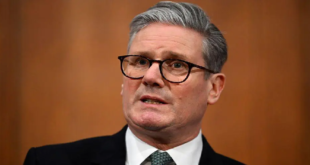By SJA Jafri
TOKYO: The Xinhua News Agency of China reports that the US has agreed to not levy new tariffs on Chinese exports following talks between the two countries’ leaders.
China and the US have agreed to restart trade talks and will have discussions on specific issues, Xinhua said.
Trump: Relations with China are ‘back on track’
 After a meeting with Chinese President Xi Jinping, US President Donald Trump says relations between the two countries are “back on track” after a breakdown in trade talks last month.
After a meeting with Chinese President Xi Jinping, US President Donald Trump says relations between the two countries are “back on track” after a breakdown in trade talks last month.
“We had a very, very good meeting with China. I would say probably even better than expected. The negotiations are continuing,” Trump told reporters.
He said both sides will be making statements later on Saturday.
The meeting between the two has been seen by analysts and economists as the most important of the G20 Summit. They say a failure to agree on ways to ratchet down the US-China trade dispute could have dire consequences for the world economy.
Cooling on the climate
In a joint press conference with representatives of France and the United Nations, Chinese Foreign Minister Wang Yi called for urgent action to address climate change.
“In our view climate change concerns the future of mankind,” he said, “so our generation needs to make the right choice. All countries need to step up to the plate and deliver on their commitments in the Paris Agreement to the full extent.”
He added: “We must promote green infrastructure, green investment, and green financing. We look forward to working with like-minded parties to build a green Silk Road to achieve high-quality development and to leave behind a clean and beautiful world for future generations.”
But these are rare words of support for fighting climate change during the G20 Summit.
While French President Emmanuel Macron has pledged not to sign any G20 statement that leaves out any reference to the 2015 Paris deal on combatting climate change, he’s up against the US, which is trying to stifle any mention of it. Under pressure from the US, Japan is on course to leave out references to global warming in the final communique.
Meanwhile G20 countries have increased their annual spending on coal-fired plants to $64bn, according to a report by the Overseas Development Institute. It also says G20 nations have tripled subsidies for the industry in recent years.
The annual summit of the Group of 20 (G20) nations has entered its second and final day in Osaka, Japan. At the top of the agenda is the ongoing trade war between China and the United States, the world’s two biggest economies.
The G20 is an international leaders’ forum comprising 19 countries and the European Union (EU).
Collectively, the grouping represents more than 80 percent of the world’s economic output and two-thirds of its people. Its primary aim is to promote international financial stability.
Here are the latest updates:
(Saturday, June 29)
Trump-Xi meeting under way: Seeking a ‘historic’ trade deal
 Meanwhile, Trump laid out his vision for the two countries trade relationship:
Meanwhile, Trump laid out his vision for the two countries trade relationship:
“As you know we’ve had an excellent relationship but we want to do something that will even it up with respect to trade,” Trump said.
“I think it’s something that’s actually very easy to do. I actually think we were very close … something happened where it slipped a little bit and now we’re getting a little bit closer, but it would be historic if we could do a fair trade deal. We’re totally open to it and I know you’re totally open to it. I think we can go on to do something that would be truly be monumental and great for both countries and that’s what I look forward to doing.”
Ping pong diplomacy and trade
The most highly anticipated event of this year’s G20 Summit is under way. US President Donald Trump and Chinese President Xi Jinping are meeting to discuss their ongoing trade dispute.
Before their meeting they made brief statements to the media.
Xi reminded Trump about the history of modern relations between China and the US, starting with a table tennis tournament between American and Chinese players in the 1970s which paved the way for formal diplomatic relations which began in 1979.
“The small ball played a big role in moving world events,” Xi said.
“Forty years on, enormous change has taken place in the international situation and China-US relations,” Xi said.
“But one basic fact remains unchanged. China and the United States both benefit from cooperation and lose in a confrontation. Cooperation and dialogue are better than friction and confrontation.”
No sign of rapprochement over trade war?
 Speaking to Al Jazeera’s programme Inside Story, Aly-Khan Satchu, economist and CEO of Rich Management, an investment advisory company in Kenya, thinks that both Presidents Trump and Xi aren’t in the mood to compromise.
Speaking to Al Jazeera’s programme Inside Story, Aly-Khan Satchu, economist and CEO of Rich Management, an investment advisory company in Kenya, thinks that both Presidents Trump and Xi aren’t in the mood to compromise.
“Overwhelming the summit is this gladiatorial combat between President Trump and Xi Jinping is the trade war, the tariff war. Essentially the direction of the global economy is going to be driven by whether these two can have a truce.
“Both of whom are going to be unable to reconcile … . Trump is a train driver but the train tracks have been set and he can either speed it up or slow it down. Xi, the paramount leader … the nature of paramount leaders and you’re up on a pedestal and everyone can point at you and he can’t compromise either.
“And while everyone’s talking about a big fat agenda, let’s make no mistake – this is about the two superpowers and about whether they can come to some kind of resolution. The direction of travel is much more adversarial and we should read the signs for what they are.”
The lead-up to the Trump-Xi meeting
Al Jazeera’s James Bays says the big event of the G20 Summit is the upcoming meeting between Trump and Chinese President Xi Jinping.
“The big discussions are going to be about trade. And this is absolutely central, I think, to the mission of the G20, which is about the world’s economic outlook because many are worried about the ongoing trade war between the US and China,” says Bays.
“Since May, trade negotiations broke down. Things could get worse or better. Trump, again, has been trumpeting about the state of the US stock market. But of course, the US stock market depends on the global economy. And economists are watching very, very closely what happens at this meeting. And they fear, in a worst-case scenario, if the trade war were to get worse, then it could tank the whole global economy.”
Trump-MBS bilateral meeting
 US President Donald Trump held a working breakfast with Saudi Crown Prince Mohammed bin Salman, also known as MBS, at a hotel in Osaka.
US President Donald Trump held a working breakfast with Saudi Crown Prince Mohammed bin Salman, also known as MBS, at a hotel in Osaka.
Neither of them answered questions about the investigation into the murder of Saudi journalist Jamal Khashoggi in Saudi Arabia’s consulate in Istanbul last year.
Trump heaped praise on MBS, saying it was “a great honour” to meet with him and described Saudi Arabia as “a good purchaser of American products.” Turning to MBS, Trump added, “You’ve done a really spectacular job.”
‘Hello’: Another Trump-Kim meeting on the cards?
US President Donald Trump began the second day of the G20 Summit by shifting the focus to the Korean Peninsula. In an early morning tweet he wrote:
“After some very important meetings, including my meeting with President Xi of China, I will be leaving Japan for South Korea (with President Moon). While there, if Chairman Kim of North Korea sees this, I would meet him at the Border/DMZ just to shake his hand and say Hello(?)!”
It did not appear that US officials had warned North Korea in advance about Trump’s unexpected offer of a meeting, and it wasn’t clear whether or not such a meeting would prove feasible.
Resisting protectionism
 Japan’s Nikkei newspaper is reporting that the G20 leaders will agree to accelerate World Trade Organization (WTO) reforms but stop short of calling for the need to resist protectionism in a communique to be issued on Saturday.
Japan’s Nikkei newspaper is reporting that the G20 leaders will agree to accelerate World Trade Organization (WTO) reforms but stop short of calling for the need to resist protectionism in a communique to be issued on Saturday.
The G20 members broadly agreed on the need to accelerate stalled WTO reforms in Friday’s session on global growth and trade, a Japanese government official told reporters, according to the Reuters news agency.
Instead of a pledge to resist protectionism, Japan is working with other G20 nations to urge members to promote a “free, fair and non-discriminatory” trade policy, the paper said. The proposal has been endorsed by several members already, it said without citing sources.
The G20 leaders will release the communique after they wrap up their two-day meeting on Saturday.
It will be the second straight G20 summit in which members forgo pledging the need to denounce protectionism. The language on protectionism was removed at last year’s summit in Buenos Aires, nodding to a request by Washington which is sensitive to criticism of the tariffs it is slapping on some G20 members.
(Friday, June 28)
Merkel hopes for US-China trade resolution
 German Chancellor Angela Merkel said she hoped the US and China would make some progress towards defusing their ongoing trade dispute.
German Chancellor Angela Merkel said she hoped the US and China would make some progress towards defusing their ongoing trade dispute.
Germany’s export-oriented economy is extremely exposed to, and already suffering from, the impact of soured trade relations between the world’s largest and second-largest economies.
Merkel said in a statement that she had discussed trade in her bilateral meeting with US President Donald Trump, who has taken to task both Beijing and Berlin, two of the world’s main exporters, on the issue.
“We hope that discussions between China and the U.S. on the margins of this conference will, along with other talks, perhaps lead to successes,” she told reporters.
Uighur leader urges world leaders to pressure China
An exiled advocate for China’s ethnic Uighur minority urged world leaders to act to prevent the disappearance of his people’s culture.
Speaking to reporters on the sidelines of the Osaka meeting, Rebiya Kadeer said strong world pressure was essential to free an estimated one million people, mostly ethnic Uighurs, held in internment camps in western China.
 “(The) entire Uighur people are facing (an) existential threat, and it’s real and urgent,” Kadeer, the 72-year-old head of the World Uyghur Congress, said through an interpreter. “I call (on) European countries who are economically dependent on China to wake up and stand up against Chinese genocide of Uighurs and take practical actions immediately.”
“(The) entire Uighur people are facing (an) existential threat, and it’s real and urgent,” Kadeer, the 72-year-old head of the World Uyghur Congress, said through an interpreter. “I call (on) European countries who are economically dependent on China to wake up and stand up against Chinese genocide of Uighurs and take practical actions immediately.”
Chinese officials describe the camps as voluntary “vocational education centres” where Turkic-speaking Uighurs receive job training.
Kadeer’s presence in Osaka will no doubt anger China, which labels her a dangerous separatist and has previously condemned Japan for allowing her entry.
Trump prepares for ‘productive’ talks with Xi on trade war
US President Donald Trump said he hoped for productive talks with his Chinese counterpart Xi Jinpingon on a trade war that is casting a shadow on global growth, but added he had not made any promises about a reprieve from escalating tariffs.
Concerns remain that an agreement will not be reached between China and the US.
“At a minimum, it will be productive,” Trump said of the meeting with Xi.
“We’ll see what happens and what comes out of it,” Trump told reporters after a series of meetings with leaders where he made clear his priority was two-way trade deals to boost the US economy.
Asked, however, if he had promised Xi a six-month reprieve on imposing new tariffs on a $300bn list of Chinese imports, Trump said: “No.”
 China hopes US can meet it halfway in G20 talks
China hopes US can meet it halfway in G20 talks
China’s Foreign Ministry expressed hope Washington can “meet China halfway” as President Xi prepares to meet Trump amid a costly tariff fight over trade and technology.
Investors are hoping for a repeat of Trump and Xi’s December agreement to postpone new tariff hikes and other action while they tried to negotiate a settlement. But analysts caution any truce at the G20 is likely to be temporary because of the array of disputes that separate the two sides.
The two sides are in a stalemate after 11 rounds of talks. Beijing has said any agreement must be balanced and rejects US complaints it steals or pressures companies to hand over technology.
“We hope that the US can meet China halfway and work together with us to promote a positive result from the meeting,” Foreign Ministry spokesman Geng Shuang said. “This is in the interest of both countries and also meets the common expectation of the international community.”
Russia, India, China condemn ‘unilateralism’
Leaders of Russia, India and China have urged joint action against unilateralism.
Meeting on Friday on the sidelines of the G20 summit, Russian President Vladimir Putin, China’s Xi, and Indian Prime Minister Narendra Modi talked about ways to bolster ties between their nations.
Putin emphasised the three countries agreed on the need to rely on international law, respect national sovereignty, and refrain from interference in internal affairs of other nations.
He added they held meetings with foreign ministers and top security officials to coordinate action against terrorism, drug trafficking and other challenges.
Putin noted Russia, China and India firmly oppose protectionism, unilateral actions, and unlawful sanctions.
 Russia must end ‘irresponsible activity’, May tells Putin
Russia must end ‘irresponsible activity’, May tells Putin
British Prime Minister Theresa May told Putin that Russia must end its “irresponsible and destabilising activity” if relations between the two countries, soured by the poisoning of a former Russian spy on British soil, were to improve.
May also told the Russian president during their G20 meeting she wanted the two Russians that the United Kingdom says is responsible for the attack on Sergei Skripal in Salisbury last year brought to justice.
“The prime minister said that the use of a deadly nerve agent on the streets of Salisbury formed part of a wider pattern of unacceptable behaviour and was a truly despicable act that led to the death of a British citizen, Dawn Sturgess,” a statement from her office said.
“[She] underlined that we remain open to a different relationship, but for that to happen the Russian government must choose a different path.”
Russia has denied any involvement in the attack.
Hong Kong still a hot button issue
In a meeting with President Xi, Japan’s Prime Minister Shinzo Abe brought up the issue of the ongoing protests against a proposed law in Hong Kong that would allow suspects to be extradited to mainland China.
Abe said it was important to preserve the territory’s freedoms for it to “prosper under ‘one country, two systems’ policy.” Before the summit began, Xi had said he didn’t want the subject raised. But Hong Kong activists have urged the G20 leaders to put pressure on the Chinese government.
 Climate change divides G20 nations
Climate change divides G20 nations
The US is trying to get G20 leaders to soften their stance against climate change. But the EU countries have fiercely rejected it. French President Emmanuel Macron said removing any reference to the Paris deal in the final statement would be a red line for him.
Trump-Putin meeting
Donald Trump has met Russian President Vladimir Putin. Al Jazeera’s James Bays was also there:
“There are many key issues these two countries differ on. And certainly, if you were to speak privately to military commanders in the US, they say they are deeply concerned about Russia, and Russia’s threats in Ukraine, Russia’s involvement in Syria, Russia trying to pull out of some treaties governing nuclear relations between the two.
“It is a tense time, but not a tense relationship, it seems, between the two leaders.”
Over the clatter of photographers’ cameras, a reporter asked Trump if he was going to tell Putin not to meddle in US elections in the future. Trump replied: “Yes, of course, I will.” He then turned to Putin with a smile and said, “Don’t meddle with the election, please!”
Focus on technology and data
After the photo session, leaders attended the “Side-Event on Digital Economy”.
Chinese President XI Jinping called for a “fair, just, and non-discriminatory market environment” and added that “data to the digital economy is the same as oil to industrial economies”.
President Trump’s comments struck a more cautious note: “At the same time as we expand digital trade, we must also ensure the resilience and security of our 5G network,” he said.
One of the sticking points in the US-China trade war is the move by Trump to bar US companies from selling key components like computer chips to Chinese telecommunications giant Huawei, a leader in the latest 5G mobile phone technology, on national security grounds.
 Trade war damages global growth
Trade war damages global growth
EU leaders on Friday warned of the damage that escalating US-China trade frictions were inflicting on the global economy, as the summit got under way.
The US-China trade relations are “difficult” and contributing to a slowdown in the global economy, European Commission President Jean-Claude Juncker told a news conference, Reuters reported.
He also said the EU was working closely with the US, China and Japan on reforming the World Trade Organization (WTO).
Meanwhile, Indian Prime Minister Narendra Modi also spoke about the need to reform the WTO.
The development of the global economy is largely driven by one-sided decisions and disputes felt by the entire system, he said.
“We should still focus on the World Trade Organization reform to achieve balanced development of the global economy and so this growth is open to everyone,” Modi told a meeting of leaders from Brazil, Russia, India, China and South Africa, collectively known as the BRICS countries, on the sidelines of the G20 summit.
No awkward moments for Saudi crown prince
Al Jazeera’s James Bays on how the Japanese have avoided upsetting Saudi Crown Prince Mohammad bin Salman at this year’s G20: “It’s worth noting that the last time there was a G20 in Buenos Aires, the family photo focused on him because there were some that wouldn’t shake his hand.
“I think the Japanese organisers knew that was embarrassing for Saudi Arabia, and we’ve seen that some of the shots of the various leaders walking together to the family photo were kept very, very wide.
“You couldn’t really make anyone out, so that, I think, the moments when people were looking rather coldly towards others or weren’t shaking hands weren’t really evident to us.”
China’s Xi says Gulf region is at a ‘crossroads’
 Chinese President Xi said on Friday the Gulf region is now in a very sensitive situation and is “standing at a crossroads of war and peace”, state media reported.
Chinese President Xi said on Friday the Gulf region is now in a very sensitive situation and is “standing at a crossroads of war and peace”, state media reported.
China always stands on the side of peace and opposes the war, Xi told United Nations Secretary-General Antonio Guterres on the sidelines of the G20 summit in Osaka, state news agency Xinhua said.
‘A fantastic woman’
After his meetings with Japanese Prime Minister Shinzo Abe and India’s Modi, President Trump had a bilateral meeting with German Chancellor Angela Merket, whom he called “a fantastic person, a fantastic woman.”
Subjects discussed included Iran, Libya, supporting the economy of Ukraine, trade negotiations with China, and global trade standards more generally.
After the meeting, Prime Minister Abe greeted each of the G20 leaders one-by-one.
Trump’s ‘good cop, bad cop’ act
 Mason Richey, a professor of international relations at Hankuk University of Foreign Studies in Seoul, tells Al Jazeera: “I think that Trump is going to be interested in playing up the positive side of the relationships that the US has with allies and strategic partners whether that be Japan, or whether that be NATO or whether that be India.
Mason Richey, a professor of international relations at Hankuk University of Foreign Studies in Seoul, tells Al Jazeera: “I think that Trump is going to be interested in playing up the positive side of the relationships that the US has with allies and strategic partners whether that be Japan, or whether that be NATO or whether that be India.
“And I think in some ways he’s perhaps playing good-cop-bad-cop with himself. He’s played bad cop with Japan and India on security issues and on trade issues. And now he’s a there playing up the positive side of the relationship, talking about how close the US relationship is with India and Japan.”
Trump, Modi and Abe meet
 President Trump arrived at the G20 summit venue by car and was greeted by Prime Minister Abe, the host.
President Trump arrived at the G20 summit venue by car and was greeted by Prime Minister Abe, the host.
“We’ll be discussing trade, we’ll be discussing military,” Trump told reporters, praising Japanese car companies building plants in the US.
“The car companies have been terrific. They’re coming in and they’re building magnificent plants. We haven’t had that, and we very much appreciate it.”
North Korea, Iran, and bilateral trade were issues raised in the discussions, though few details were offered.
Later, Indian Prime Minister Modi joined for a trilateral meeting. Abe described the grouping as “the foundation of peace and prosperity in the region”.
As for US-India trade talks, Trump declared, “It’ll be very positive … I think we will just continue to get along with India … I think we are going to have some very big things to announce. Very big trade deal.”
In a tweet on Thursday, Trump said Indian tariffs on US products were “unacceptable”.
Earlier this month, India imposed higher retaliatory tariffs on 28 US goods such as walnuts, almonds and apples.
That was in retaliation for Trump’s move to scrap trade privileges under the Generalized System of Preferences (GSP) for India, the biggest beneficiary of a scheme that allowed duty-free exports of up to $5.6bn a year.
Speaking of Iran, Trump stated, “We have a lot of time – there’s no rush they can take their time. There is absolutely no time pressure. Hopefully, in the end, it’s going to work out. If it does, great, if it doesn’t, you’ll be hearing about it.”
(Source: Al Jazeera & Agencies)
 Pressmediaofindia
Pressmediaofindia




